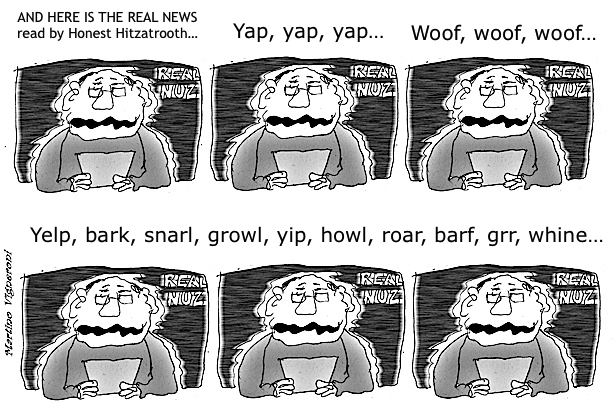Search
Recent comments
- stenography.....
5 hours 22 min ago - black....
5 hours 20 min ago - concessions.....
6 hours 22 min ago - starmerring....
10 hours 27 min ago - unreal estates....
14 hours 13 min ago - nuke tests....
14 hours 16 min ago - negotiations....
14 hours 19 min ago - struth....
1 day 4 hours ago - earth....
1 day 4 hours ago - sordid....
1 day 5 hours ago
Democracy Links
Member's Off-site Blogs
your daily pills on the hour...

The news on tele, on the net, on radio and in the newspapers is a shocking collection of useless twaff, on the hour, daily, like badly pre-digested dog food wobbling out of tincans...
Most news isn't information, but a voyeuristic exercise into scratching the scabs of humanity. Presently they start with "Covid (19)", "Coronavirus", "Trump", "the prime minister today announced" or "the economy"... Here, on this site dedicated to share democracy, we try hard to coat the awful news with a veneer of satire, with less than average success at improving the degrading landscape...
If we don't cry, it is because our satirical heart is armoured like a Sherman tank to be able to survive amongst the rubbish... and here is one sad news — apart from some wars somewhere — to even break our shield:
A harrowing image of a herd of elephants eating from a rubbish dump in Sri Lanka, by Tilaxan Tharmapalan, has won first prize in this year's Royal Society of Biology (RSB) photography competition.
https://www.bbc.com/news/in-pictures-54435105
So, Gus will post a few ordinary photos from his collection about nature, as well.... Why not?
- By Gus Leonisky at 9 Oct 2020 - 8:35pm
- Gus Leonisky's blog
- Login or register to post comments
a couple of photos..
more photos...
growing wheat in the Australian desert...
storm approaching Kalimburu (Kimberleys)
roads towards infinity, Australian bush
views from above...
Coober Pedy
Katajuta
Following gradients
australia from above...
Riverbank by the side of tall cliffs, north of Australia...
Mangroves and salt, north of Australia
Old mountains, centre of Australia
(All pictures in this line of info by Gus Leonisky)
the bugs are back
These little bugs (other pictures by GL, already posted on this site) are no more than 2 milimetres wide and long... The eggs are about 1.2 mm...
Native grasses, one of Sydney's national park (old BP depot)...
The Australian brush turkey (Alectura lathami), also known as the bush or scrub turkey, has a bad reputation.
Brush turkeys are blamed for damaging gardens and darting across roads. Found in eastern Australia from Far North Queensland to the Illawarra in New South Wales, they've managed to adapt to life in cities such as Brisbane and Sydney, and have also been introduced to Kangaroo Island in South Australia.
The characteristic nature of the brush turkey is to lurk in gardens making an awful mess as it digs up leaf litter, twigs and dirt.
But there are good reasons to admire — if not love — this native bird, as revealed by 'turkey whisperer' Professor Darryl Jones of Griffith University.
Read more:
https://www.abc.net.au/news/science/2017-01-17/five-reasons-to-love-brush-turkeys/7199724